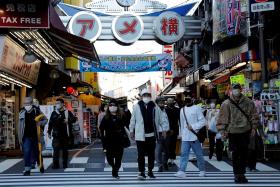Easter Sunday bombings: Coordination of blasts is ‘extremely chilling’
Sri Lanka explosions mark first major attack since end of civil war a decade ago
COLOMBO: The Easter Sunday bomb blasts at three churches and four hotels in Sri Lanka were the country's first major attack since the end of a civil war 10 years ago.
The three churches hit were St Sebastian's Church in Negombo, St Anthony's Shrine in Colombo and Zion Church in Batticaloa.
The hotels hit in Colombo were the Shangri-La, the Kingsbury, the Cinnamon Grand and the Tropical Inn near the national zoo.
There was an eighth explosion at a house in Colombo. Police and media said three officers were killed and seven people detained during a raid on this location. An eighth person was arrested later.
There were no immediate claims of responsibility for the attacks in a country that was at war for decades with Tamil separatists until 2009, a time when bomb blasts in the capital were common, Reuters reported.
Mr Rajiva Wijesinha, a former member of the Sri Lankan Parliament, told Al Jazeera the coordinated nature of the attacks has shocked the country.
"It is actually extremely chilling. We have never had anything of this sort before.
"Sri Lanka had a terrible time under Tamil Tiger terrorism for about 25 years and then there was a great sense of relief, which I am afraid the West has been fighting with us about, when we got rid of the Tiger terrorists," Mr Rajiva said.
"But the Tiger terrorists were never as well organised, never quite as brilliant in synchronisation, and this is obviously something on a much larger scale, which is frankly quite terrifying, and you know, the reactions I have heard suggest people are moving into panic mode again.
"And that is understandable because of the range of these attacks and the concentration on the Christian churches and then the hotels as well suggest we are dealing with something really quite horrible."
CURFEW
Soon after the eighth blast, the government declared a curfew in Colombo and blocked access to social media and messaging sites, including Facebook and WhatsApp. It was unclear when the curfew would be lifted.
Documents seen by AFP showed that Sri Lanka's police chief Pujuth Jayasundara had issued an intelligence alert to top officers 10 days ago, warning that suicide bombers planned to hit "prominent churches".
"A foreign intelligence agency has reported that the NTJ (National Thowheeth Jama'ath) is planning to carry out suicide attacks targeting prominent churches as well as the Indian High Commission in Colombo," the alert said.
The NTJ is a radical Muslim group in Sri Lanka that was linked last year to the vandalisation of Buddhist statues.
Sri Lankan Prime Minister Ranil Wickremesinghe called a national security council meeting at his home later in the day.
"Please avoid propagating unverified reports and speculation. The government is taking immediate steps to contain this situation," he said.
The heads of major governments condemned the attacks.
President Donald Trump said the United States offered "heartfelt condolences" and stood ready to help.
Indian Prime Minister Narendra Modi said there was "no place for such barbarism in our region", and Turkish President Tayyip Erdogan said the bombings were "an assault on all of humanity".
Pope Francis, addressing tens of thousands of people gathered in St Peter's Square in Vatican City to hear his Easter Sunday message said: "I wish to express my affectionate closeness to the Christian community, hit while it was gathered in prayer, and to all the victims of such cruel violence."
Ms Jacinda Ardern, the Prime Minister of New Zealand where a gunman shot 50 people dead in two mosques last month, said in a statement: "Collectively we must find the will and the answers to end such violence."
Get The New Paper on your phone with the free TNP app. Download from the Apple App Store or Google Play Store now




